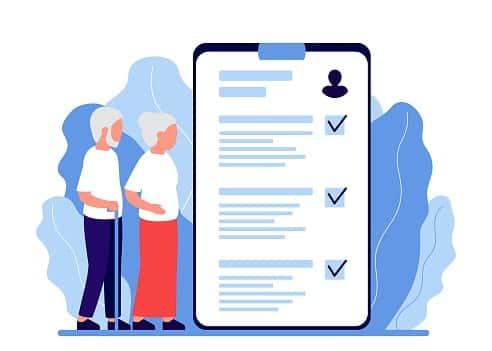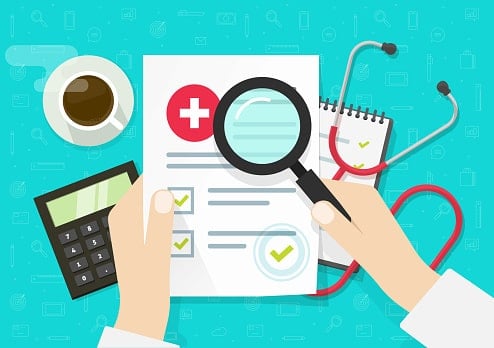- What is a qualifying life event?
- How a qualifying life event special enrollment period works
- What qualifies as a life-changing event for insurance?
- Who is eligible for a qualifying life event enrollment period?
- What kind of documents do you need for a qualifying life event?
- What if you don't have a qualifying life event and need health insurance?
- Can I drop my health insurance without a qualifying event?
- What is an open enrollment period?
- Sources
- Frequently asked questions
What is a qualifying life event?
A qualifying life event (QLE) makes you eligible for a special enrollment period (SEP).
It’s an event that may trigger a need for health insurance or to make changes to your health plan, says Christian Worstell, a licensed health insurance agent with MedicareAdvantage.com.
Essentially, experiencing a life-changing event means you don’t have to wait until the annual open enrollment period to get coverage.
Here are a few tips to benefit most from the open enrollment period.
How a qualifying life event special enrollment period works
When you experience a qualifying life event such as the death of a spouse, birth or adoption, or moving to a different state, a special enrollment period opens for you. During special enrollment, a person can get health insurance or change coverage.
A qualifying life event can trigger a special enrollment period at any point during the year.
For an ACA marketplace plan, you can purchase a new policy or make changes to your existing policy 60 days before your qualifying life event -- or 60 days after. You have to wait until the annual open enrollment period to buy or modify coverage if your deadline passes.
Two ways to get health insurance during the special enrollment period are through either your state's insurance marketplace or the federal HealthCare.gov site. You'll submit an application with your personal information and check off which qualifying life event you have experienced.
After you complete the application, the site offers your health insurance plan options. You can choose a policy with your preferred coverage limit and deductible, and in most cases, you can buy a policy online.
Employer-provided health plans also have special enrollment periods when you have a qualifying life event. Check with your employer to find out how it handles special enrollment periods.
What qualifies as a life-changing event for insurance?
Many types of qualifying life events can make you eligible for a special enrollment period. Here’s a list of qualifying events for health insurance:
- Losing coverage through your employer
- Ending COBRA coverage
- Gaining a dependent
- Getting married or divorced
- Loss of a family member
- Having a baby
- Adopting a child
- Moving to a new state (including college students)
- Becoming a U.S. citizen
- Getting out of prison
- Turning 26 while insured on a parent's policy
Who is eligible for a qualifying life event enrollment period?
Anyone over the age of 26 is eligible for a qualifying life event special enrollment period. You don't need to have an existing insurance policy to qualify.
For example, a 28-year-old woman who is uninsured would be allowed to purchase health insurance during a special enrollment period if she recently had a baby. Similarly, a 55-year-old would be allowed to adjust coverage during the SEP if their child turned 26 and was no longer eligible to stay on their plan.
What kind of documents do you need for a qualifying life event?
If you want to purchase health insurance during the special enrollment period, you need to show proof of the qualifying life event. In most cases, you have 30 days to show this documentation before your policy can be approved and your coverage takes effect.
The documentation required depends on the type of qualifying life event. For instance, if you recently had a baby, the child's birth certificate would serve as sufficient proof. If you lost coverage through your employer, you might submit a letter of termination from your old health insurance provider. If you move to a new state, a utility bill with your name and address or a signed lease agreement would work.
What if you don't have a qualifying life event and need health insurance?
You still have a few options if you need health insurance outside of the annual open enrollment period but haven't experienced a qualifying life event.
The first option is to consider enrolling in a Medicaid plan if you meet the income requirements. Medicaid is a federally-funded health insurance program that’s reserved for low-income families. There's no open enrollment period for Medicaid, so you can purchase coverage at any time.
A similar program with no open enrollment period is the Children's Health Insurance Program (CHIP). It can help you get affordable coverage outside of open enrollment if you have kids. Some state CHIP programs are rolled into Medicaid, while others are separate programs.
If you don’t qualify for Medicaid or CHIP, another option is to purchase short-term health insurance. These policies can be purchased in most states directly from private health insurance companies at any point during the year, without a qualifying life event.
These low-cost plans have limited benefits, so it’s wise to only keep short-term health insurance until you’re eligible for a health plan with comprehensive coverage, such as an ACA or employer plan.
Can I drop my health insurance without a qualifying event?
You're allowed to cancel an individual health insurance policy at any point during the year, even if you didn't experience a qualifying life event. However, you must have experienced a qualifying life event to cancel group health insurance through your employer -- unless you leave the job.
What is an open enrollment period?
The open enrollment period is a specific time when consumers can purchase a new individual health insurance policy or make changes to their existing policy. Open enrollment typically happens between November 1 and January 15 for ACA marketplace plans.
There are a handful of states that have longer ACA open enrollment.
Most pre-retirement members get their health insurance through an employer’s group plan. Open enrollment for those group health insurance plans varies by employer. Check with your company if you don’t know when it holds open enrollment.
Know more about the Open enrollment period for 2024.
Health insurance finder tool

COBRA
Learn more about COBRA
How much is your annual household income?
How many members are in your household?
Medicare
Medicare costs vary depending on which option you choose.
Learn more about Medicare costs.
Medicaid

Parent's employer-sponsored health insurance

Spouse's employer-sponsored health insurance

Employer-sponsored health insurance

Preferred-provider Organization (PPOs)
Preferred-provider organization (PPOs) plans are the most common type of
employer-based health plan. PPOs have higher premiums than HMOs and HDHPs, but
those added costs offer you flexibility. A PPO allows you to get care anywhere
and without primary care provider referrals. You may have to pay more to get
out-of-network care, but a PPO will pick up a portion of the costs.
Find out more about the differences between plansHealth maintenance organization (HMO)
Health maintenance organization (HMO) plans have lower premiums than PPOs.
However, HMOs have more restrictions. HMOs don't allow you to get care outside
of your provider network. If you get out-of-network care, you'll likely have to
pay for all of it. HMOs also require you to get primary care provider referrals
to see specialists.
Find out more about the differences between plansHigh-deductible health plans (HDHPs)
High-deductible health plans (HDHPs) have become more common as employers look
to reduce their health costs. HDHPs have lower premiums than PPOs and HMOs, but
much higher deductibles. A deductible is what you have to pay for health care
services before your health plan chips in money. Once you reach your deductible,
the health plan pays a portion and you pay your share, which is called
coinsurance.
Find out more about the differences between plansExclusive provider organization (EPO)
Exclusive provider organization (EPO) plans offer the flexibility of a PPO with
the restricted network found in an HMO. EPOs don't require that members get a
referral to see a specialist. In that way, it's similar to a PPO. However, an
EPO requires in-network care, which is like an HMO.
Find out more about the differences between plans
Learn more about individual insurance plans
Sources
- Medicare.gov. "Understanding Special Enrollment Periods."
- HealthCare.gov. "Qualifying life event."
Frequently asked questions
Is Medicare eligibility a qualifying event?
Becoming eligible for Medicare isn’t considered a qualifying life event. However, assuming you have private health insurance coverage, you can drop your individual health insurance policy when you become eligible and enroll in Medicare.
You can get Medicare starting three months before your 65th birthday and ending three months after you turn 65.
Is a spouse getting a job a qualifying life event?
A spouse getting a new job counts as a qualifying life event because they lose their previous group coverage. In this case, they're able to enroll in their new employer's group health insurance plan within 30 days of their start date.
Is getting a new job a qualifying life event?
Getting a new job is not considered a qualifying life event. However, if you lose your existing job-based health insurance plan is considered a qualifying life event.
Is divorce a qualifying event for health insurance?
Yes, divorce is a qualifying life event for health insurance. You would be able to purchase your own individual policy through a SEP. However, you must have a divorce decree or proof of legal separation to take advantage of the SEP.













